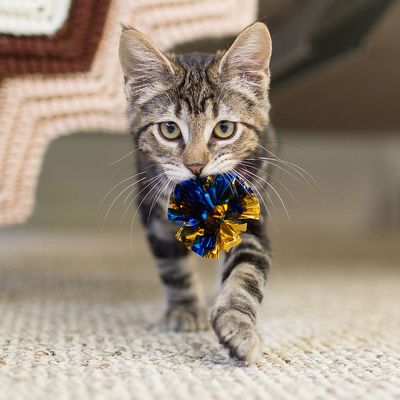
Cats were domesticated, if you can call it that, between five and ten thousand years ago, depending on the scholar you talk to. They share 95 percent of their genes with tigers. It’s unsurprising, then, that giving them a little more time hunting is good for feline well-being.
That’s a big finding on a new study in Journal of Feline Medicine and Surgery written up by George Dvorsky at Gizmodo. Basically, since house cats are still very much lethal, resourceful, and canny stalkers, giving them an outlet for hunting behavior is super healthy. With a puzzle feeder, where the animal has to “solve” getting to food by batting things with its paws, there’s a bigger workout than eating out of a freely given bowl. “These puzzles take advantage of the feline hunting instinct, fulfilling their ingrained desires,” Dvorsky writes. “By ‘foraging’ for food in this way, cats are more physically active, they experience reduced levels of stress, and they become less demanding of their owners.” One need not spring for a luxe cat puzzle feeder, though they do look quite awesome. A water bottle, an Easter egg, or an egg carton are enough to put together a DIY version, like in the heartwarming video below.
The veterinarians behind the study say that food puzzles have worked wonders in their own practice, like the kitty equivalent of CrossFit. According to Dvorsky, there was a 2-year-old cat who got less fearful around people, a 3-year-old who exhibited less aggression, and an obese 8-year-old shorthair that lost 20 percent of its weight after a year of puzzling after its food. Since cats love nutrition, it makes sense they’d be into fitness, too.




